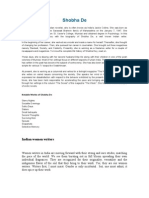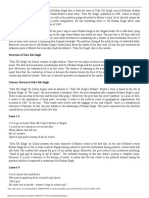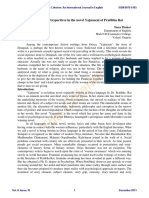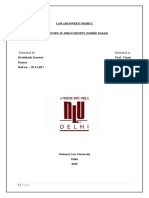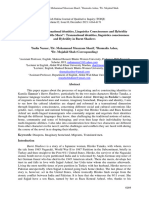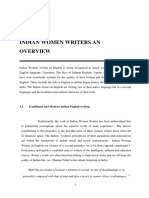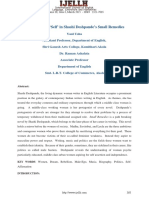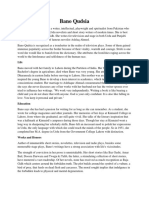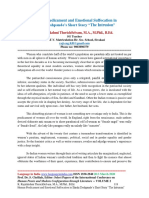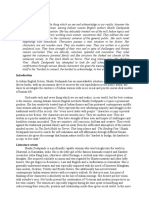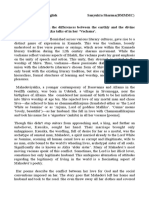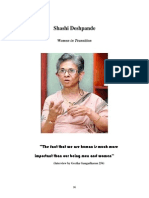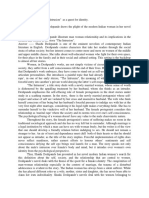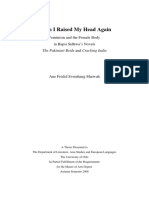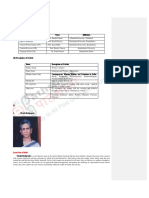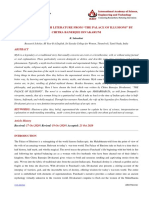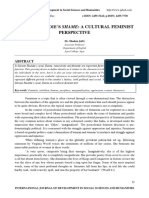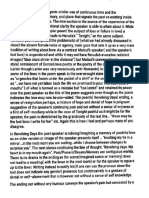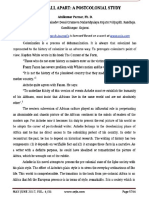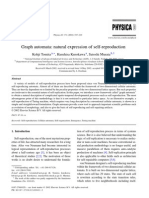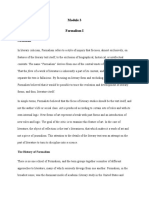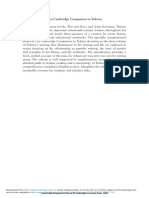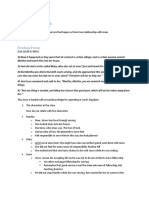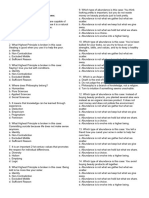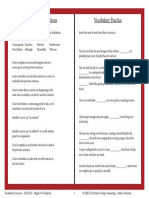Professional Documents
Culture Documents
62.sangeeta Article
62.sangeeta Article
Uploaded by
I RoyOriginal Description:
Original Title
Copyright
Available Formats
Share this document
Did you find this document useful?
Is this content inappropriate?
Report this DocumentCopyright:
Available Formats
62.sangeeta Article
62.sangeeta Article
Uploaded by
I RoyCopyright:
Available Formats
www.TLHjournal.
com Literary Herald ISSN: 2454-3365
An International Refereed English e-Journal
Impact Factor: 2.24 (IIJIF)
Shashi Deshpande’s Ships That Pass: A Critique
Sangeeta
Research scholar
DSMNR University, Lucknow
Shashi Deshpande projects mysteriosophy in human relationship which take off
the emotions at high esteem. It seems that writing as an art is inherent in her blood by her
father‟s genes. She articulates the mysterious human psyche which has been never
touched before by anyone. It is her unconscious profession which flourishes to new
heights in Indian English writing. She does not prefer to call herself as feminist writer;
her choice goes with writing and representing feminine aspect as well as other aspects.
Now the question is that when man and woman, both are writing and reading all topics,
then how a woman becomes a feminist automatically and male writer is considered as
omniscient in all issues. She loves to write on all aspects of mysterious human nature but
prefers feminist issues.
Shashi Deshpande loves to expound the mystery in human behavior from artificial
and oblivious aspects. She represents motley dimensions of work which leads to
mysterious element in her work. She creates a web of mysterious elements in the Ships
That Pass where Radhika represents a young generation. While crossing the road she
takes the decision to get married but is not ready to follow the marital rituals. Next, Tara
grieves over Geetu‟s death being a mother but in another moment she represents that she
and Shaan do not deserve the parentage of Abhi. Third mystery is related with ram
Mohan who is introduced as a doctor of Tara. In the next segment, Shaan is portrayed as
sincere husband who is concerned about his wife‟s health and call Radhika to look after
her, but later on discovers that Shaan has engaged him in extra marital affair. Shashi
Deshpande weaves the mystery which mingle-mangle all relationship in the novel.
Key words: Family Relationship, Murder, Mystery, Marriage
Vol. 2, Issue 4 (March 2017) Dr. Siddhartha Sharma
Page 514 Editor-in-Chief
www.TLHjournal.com Literary Herald ISSN: 2454-3365
An International Refereed English e-Journal
Impact Factor: 2.24 (IIJIF)
Shashi Deshpande’s Ships That Pass: A Critique
Sangeeta
Research scholar
DSMNR University, Lucknow
Shashi Deshpande projects mysterious characteristics in the human
relationship which take off the emotions at high esteem. She articulates the mysterious
human psyche which has been ever touched before by anyone. It is her unconscious
profession which flourishes to new heights in Indian English Writing. It is an important
task before the Indian English writer is to write in the English language in a manner that
conveys the fragrance of the real socio – culture of India. It is important to sprouts out the
essence of theme without distorting the language. It seems that writing as an art is
inherent in her blood by her father‟s genes. She does not consider English as foreign or
colonizer language, but the medium of creativity in her prospect. Her thoughts wonder
between the language and writing which explores by everyone. Her writing‟s depth
decides the depth of her intensity in the work instead of language. She doesn‟t prefer to
call herself as feminist writer; her choice goes with writing and representing feminine
aspects as well as other aspects. Now the question is that when man and woman, both are
writing and reading all topics, then how a woman becomes a feminist automatically and
male writer is considered as omniscient in all issues. She loves to write on all aspects of
mysterious human nature but in all prefers feminist issues.
Shashi Deshpande loves to expound the mystery from the middle class ethos in
human behaviour. She contributes to Indian English writing which place her in canon. It
raises the hope of reader at her work Ships That Pass which story was first published in
Eve‟s Weekly in 1980. It depicts about people and their mysterious selves instead of
detect the characters. She unsatisfied to shape the real essence of story in serializations
for magazine. It lost the real essence of the story therefore she decides to rewrite the
Vol. 2, Issue 4 (March 2017) Dr. Siddhartha Sharma
Page 515 Editor-in-Chief
www.TLHjournal.com Literary Herald ISSN: 2454-3365
An International Refereed English e-Journal
Impact Factor: 2.24 (IIJIF)
story, Ships That Pass. It bases on complete story of love and mystery. Though time has
changed, it does not change the mystery of human mind. It remains the great mystery of
all time. She admires crime and mysterious story when she was young. She fascinates
with the story Murder Most Foul which inspire her to write something mysterious.
Shashi Deshpande elaborates the mysticism of human relationship in Ships That
Pass. She represents motley dimensions of her work which leads to mysterious elements
in her work. She creates a web of mysterious characteristics in the Ships That Pass. In the
beginning of the novella, she presents Radhika‟s character as a young generation girl who
assumes as a working woman by her family member. Radhika‟s family persuades her for
preparing competitive examinations like IAS after completing the college. They justify it
by correlating her working status to her marital life. It seems that they think working
woman considered as enjoying prestigious status in the society, but Radhika‟s conundrum
reflects something else. She thought of marriage instead of career option whereas her
friends have planned for a definite career. Shashi Deshpande writes,
“I stalked away from my friends in a foul temper. And then, while I
was crossing the road, at a point behind the Bombay University
building- a spot for me to remember, like the Buddha‟s Peepal tree
in Bodh Gaya- there came enlightenment. Revelation.” (
Deshpande, 9)
Shashi Deshpande exhibits the mysterious aspect of a youth who takes decision of
marriage while crossing the road. She projects the road as Buddha‟s Peepal tree in Bodh
Gaya. A youth like Radhika has decided regarding marriage simply as she plans for
shopping, party, movie etc... She symbolises as an educated youth whose friend Rashmi
plans for a medical studies, and another friend Supriya precedes her father‟s profession to
become as a lawyer. In the context, Shashi Deshpande displays a contrast exhibition of
psychological level of same generation.
Shashi Deshpande develops the mystical aspect in the beginning of the novel. The
reader tries to understand the reason of Radhika‟s decision of marriage who defies her
Vol. 2, Issue 4 (March 2017) Dr. Siddhartha Sharma
Page 516 Editor-in-Chief
www.TLHjournal.com Literary Herald ISSN: 2454-3365
An International Refereed English e-Journal
Impact Factor: 2.24 (IIJIF)
own decision but in next segment, she refuses to wear sari which expresses such beautiful
way.
“So when Aai asked, “You will wear a sari, won‟t you, when they
come?‟, I protested, „They‟ had suddenly become a potent force in
my life, in all our lives, actually. „A sari?‟ I was prepared to get into
the act of a girl being „seen‟ by her possible in-laws. But a sari?
No‟, I said firmly.” (Deshpande, 10)
It looks another mysterious concept where Radhika chooses marriage over the
career and then, she refuses to wear sari. It puzzles to connection of marriage and
protestation of wearing sari. It is strange to imagine an Indian society justify a marriage
without sari? It is automatically understood that Indian Bride weened in traditional outfit.
Shashi Deshpande sprinkles the element of curiosity and develops the quest for happen in
reference of Radhika.
As novella moves forwards, Tara and Shaan relationship flourishes different
shade of colour which is beyond to understand by Radhika. It becomes shocking to
Radhika for hearing how Shaan could comment that-“I have no influences over her at
all.” (Deshpande, 17) Radhika observes them as an ideal couple since childhood. Tara
gave up everything for Shaan to just get marrying. Radhika amazes to see shaan reaction
for whom her sister blindly jumps into marriage. Shaan calls Radhika to inform about the
Tara‟s health which seems much more mystical as it seems. Radhika decides to visit
Tara‟s house and clarify her curiosity. As soon as Radhika arrived to Tara‟s house, she
tries to find the truth. Tara tried hard to hide and proclaim everything normal, but small-
small things mingle more the complexity of the mystery. Shaan appears to be sincere and
caring husband, but he does not arrange any medical treatment for Tara. As novella move
forwards, Shaan linked up with Rohini for extra martial affair.
Shashi Deshpande expounds an unusal mysterious chemistry between Tara and
Shaan. It confuses regarding actual relationship of the couple how a caring husband could
engage in extra marital affair. Why he calls Radhika if he plans to cheat Tara. The
Vol. 2, Issue 4 (March 2017) Dr. Siddhartha Sharma
Page 517 Editor-in-Chief
www.TLHjournal.com Literary Herald ISSN: 2454-3365
An International Refereed English e-Journal
Impact Factor: 2.24 (IIJIF)
mystery left unsolved over the characteristics of Shaan and move forwards to Tara‟s
characteristics.
Shashi Deshpande elaborates the bewilderment of Geeta‟s death which shakes the
soul of Tara. In this episode, Tara shown psychological disturbance and need for medical
treatment. In later segment, it discloses in the conversation with Radhika that she over
comes from the grief of Geeta‟s death.
“Akka spoke to me of Geetu for the first time... Shaan has an
absurd idea that I‟m still grieving over her‟, She said. „Of course I
am, how can anyone forget one‟s own child? I will never stop
grieving‟... But I have accepted the fact that she‟s gone, that it‟s all
over. The day I came back from the hospital ... I knew she had
gone. In fact, to see her suffer was worse, the hope that she would
recover, that there would be some kind of a miracle and she would
be all right- that was the worst thing. It was a kind of torture. I was
thankful when the end came.”(Deshpande, 88-89)
Shashi Deshpande represents Tara occasionally portraits as composed personality it
illustrates during the conversation with Radhika over Geetu‟s death. Her personality
reflects very talented and active woman in the beginning of novella. Shaan shows a
caring husband and mature enough to handle Geetu‟s death which could not make an
issue between them. It seems a kind of finality in her voice and acceptance of fact. She
accepts the fact despite of she fells sick for Geetu. Thus, it raises another mystery which
quest for her sickness. It mingles the prejudice of reader‟s mind regarding her acceptance
of Geetu‟s death and her sickness over Geetu‟s death.
Shashi Deshpande expresses the biases motherhood of Tara at strange level. It can
only assume that Geetu‟s death is responsible for Tara mental state. She shows her
gratitude towards the dead child Geetu and neglect to alive child Abhi totally. Radhika
observes,
Vol. 2, Issue 4 (March 2017) Dr. Siddhartha Sharma
Page 518 Editor-in-Chief
www.TLHjournal.com Literary Herald ISSN: 2454-3365
An International Refereed English e-Journal
Impact Factor: 2.24 (IIJIF)
“Akka herself seemed to be drifting vaguely through life, denying
everything: Geetu‟s death, her sorrow for Geetu, even her love for
her son, Abhi. She was very casual with him most of the time, often
irritable with him. Yet, I saw her sitting by his bed one night after
he had fallen asleep, doing nothing, just sitting there, looking at
him with such intensity that it was frightening.” (Deshpande, 32-
33)
She has portrayed double standard of motherhood in which one towards Geetu
descries the sensitive mother; on another side explores ignorance towards Abhi. Shashi
Deshpande explores the characteristic of motherhood in active and inactive pose. It raises
the question of mystery how one character would different towards own children. It
shows another aspect of Tara when she argues to Shaan that “In fact, she said we don‟t
deserve Abhi either, that we are not fit to be parents.” (Deshpande 52) it becomes
difficult to understand the mysterious characteristics of Tara‟s motherhood.
It diverts at different dimension of Indian society which explores new side of
women characteristics in reference of Tara. Shashi Deshpande depicts Tara‟s character as
smart, beautiful, talented youth and her married life goes awesome in view of society.
Then, how she leads towards the mental trauma and bias attitude towards own child.
Even, Tara draws the mystery draws over Tara‟s death. It does not expound towards
reader even at the last line whether she was murdered, suicide or natural death. Her death
mystery sketch many dimension but do not move forward either side. Shashi Deshpande
beautifies to raise the suspense but it shatters in different dimension which leave question
mark in the reader‟s mind. The whole novella dedicated towards the Tara or Tara‟s health
and the end come clueless. Shashi Deshpande provides the speculation of Tara‟s murder,
suicide or natural death.
There are many clues prompt of her murder which directs towards the Shaan. It
could be the possibility that Shaan plans murder for Tara. He calls Radhika so that later,
he can project himself innocent and caring daring husband by calling Radhika to look
Vol. 2, Issue 4 (March 2017) Dr. Siddhartha Sharma
Page 519 Editor-in-Chief
www.TLHjournal.com Literary Herald ISSN: 2454-3365
An International Refereed English e-Journal
Impact Factor: 2.24 (IIJIF)
after her sister. He has an extra marital affair with his neighbour Rohini which discovers
later by Radhika. It could possible that he plans for marry to Rohini. And, Tara knows all
about it and she might object over the matter. It may be reason behind Tara‟s ill health
which assume as reaction of Geetu‟s death. Shaan may fade-up with the dispute between
the couple. He can take step of her murder because Shashi Deshpande does not give him
clean chit regarding the accusation of Tara‟s death. The mystery of Shaan‟s character
does not clear which remained as a question mark. Why does Shaan arrest and how does
he release? There is no clue behind the Shaan arrest and release. It well maintains the
myth over it.
Tara‟s death took another dimension which direct to commit suicide. Shashi
Deshpande mingles mangle the death mystery of Tara‟s death. If it concentrates on
second assumption of Tara‟s death, it will become easy to justify. Tara‟s murder has just
an assumption which is the part of mysterious characteristic enhance by Shashi
Deshpande. Tara interprets as a mentally disturb patient. Shaan calls Radhika for her. It
discovers that Tara had tried to attempt suicide twice. Shaan said to Radhika,
“You know, Radhu, I think she hasn‟t stopped grieving for Geetu.
Sometimes I have a strange feeling that she welcomes her pain, as
if it‟s a just punishment for Geetu‟s death. It‟s been nearly two
years now, but I have this strange feeling that she‟s still listening
for Geetu‟s voice, or her footsteps. As if she thinks she‟s still
around. I don‟t know, it sounds stupid, but that‟s how I feel.
(Deshpande 31)
It seems Tara forgets to live life. She traps in her subconscious of Geetu‟s death.
It speculates that she takes action of suicide only to console its guilt conscious. She may
think that it only left way to overcome from the trauma. It observes that Tara had tried
enough to come on normal track but she trapped in mental trauma again in next episode.
It could possible reason to take step behind Tara‟s death.
Vol. 2, Issue 4 (March 2017) Dr. Siddhartha Sharma
Page 520 Editor-in-Chief
www.TLHjournal.com Literary Herald ISSN: 2454-3365
An International Refereed English e-Journal
Impact Factor: 2.24 (IIJIF)
Shashi Deshpande develops another episode over Tara‟s death. It seems neither
murder nor suicide cause behind her death. She may pass away through natural cause. It
already understands that she shows as a suffer candidate who gets relief only by death.
There is no wonder of her death. She does not show any connivance in her life. She
swings many times between the life and death. Her health is the major cause of her death.
It can speculate over murder or suicide, but her death will not benefit to anyone. It raises
the possibility of her natural death. Shashi Deshpande creates the web of assumptions
over Tara‟s death. The thread of assumption is in reader‟s hand wherever they want to
drag or lose it.
Shashi Deshpande introduces another curiosity of Radhika who married to Ram
Mohan in the last of novella. It does not show any chemistry between them. In fact,
Radhika has not shown any normal liking towards the Ram Mohan in the beginning.
They share normal relationship as common human being has to each other. Their age
difference has not clue anything like to happen last. Radhika has already engaged to
Ghanshyam and her emotion involves with Ghanshyam. She does not welcome Ram
Mohan even friendly as this conversation shows this.
“Let me complete the introduction. This, as you have guessed, is
my sister, Radhika.‟
„Tara‟s little sister, Radhika.‟
„You used to call him Ram uncle.‟
My first wild thought was – I can‟t possibly call him Ram uncle.
And my second was – I‟ll get a crick in my neck looking up at him.
I felt like a midget, a circus dwarf. Actually, there was nothing
intimidating about him.” (Deshpande 35)
This conversation expounds the Radhika‟s view towards Ram Mohan. This is an
introductive communication in which it reflects nothing intimidating about them. The
whole novella moves with normal communication which does not show anything
glittering between them. Ram Mohan helps Radhika only to resolve her sister‟s death
Vol. 2, Issue 4 (March 2017) Dr. Siddhartha Sharma
Page 521 Editor-in-Chief
www.TLHjournal.com Literary Herald ISSN: 2454-3365
An International Refereed English e-Journal
Impact Factor: 2.24 (IIJIF)
mystery. They meet with selective prospect of investigation and collecting evidence of
Tara‟s death. Shashi Deshpande modifies their normal relationship to marriage. It comes
to notice about their emotion in the last two chapters. This relationship does not develop
forward, simply next chapter‟s first line predicts.
“There‟s very little left to tell. Ram Mohan and I got married very
soon after. Dada and Aai were happy for us and everyone decided
there was no need to wait, it was a simple registered wedding.”
(Deshpande 128)
After this segment, they show happily married couple. Shashi Deshpande interlinks
many dimensions to Radhika marriage mystery. An engaged girl visits her sister house
and later busy in investigate Tara‟s death mystery. Her engagement breaks off without
solids reason and she married to Ram Mohan. Whom she used to call him uncle and the
age difference vanishes in a second somewhere. The whole marriage episode raises many
curiosity and confusion in reader‟s mind.
Towards the end, Shashi Deshpande depicts the different aspects of allusion of
women psyche in a reform way. All the characters are in allusion which portrayed the
modern human psyche‟s alienation and allusion in the society which weaves the web of
relationships beautifully. The characters are suppressed by their own thought process
rather than society. It creates the dilemma in the character which explores the mystic
thought in their life. It can only analyse at last that Ships That Pass is the mystery of
human mind in context of modern isolated society.
WORK CITED
Agrwal, Beena. Mosaic of The Fictional World of Shashi Deshpande, New
York : Book Enclave Publishers, 2009. Print.
Abrams, M.H. A Glossary of Literary Terms. 7th ed.1999. Banglore : Prism
Book Pvt. Ltd. , 2003. Print.
Vol. 2, Issue 4 (March 2017) Dr. Siddhartha Sharma
Page 522 Editor-in-Chief
www.TLHjournal.com Literary Herald ISSN: 2454-3365
An International Refereed English e-Journal
Impact Factor: 2.24 (IIJIF)
Atrey, Mukta and Viney Kripal. Shashi Deshpande: A Feminist Study of Her
Fiction. New Delhi: B. R. Publishing Corporation, 1998. Print.
Deshpande, Shashi. Ships That Pass. New Delhi: Raintree, 2012. Print.
---. Interview: Language No Bar. The Sunday Times of India. Ahemdabad, 23 April
1995. 10. Print.
---.Interview by Geeta Gangadharan, Denying The Otherness, Indian Communicator,
Sunday Magazine, 20 Nov. 1994. 11. Print.
Jaggar, Alison M. Feminist Politics and Human Nature. New Jersey : Rowman and
Allanheld Publishers,1983. Print.
Mukherjee, Meenakshi. The Twice- Born Fiction: Theme and Techniques in the Indian
Novel in English. 2nd ed. New Delhi: Arnold- Heinemann, 1971. Print.
Mehta, Sangita, and Rekha Chutani. Studies in Literature and Literary Theory. New
Delhi: Adhyayan Publishers and Distributors, 2011. Print.
Vol. 2, Issue 4 (March 2017) Dr. Siddhartha Sharma
Page 523 Editor-in-Chief
You might also like
- The Logic of Evil - The Social O - William Brustein PDFDocument253 pagesThe Logic of Evil - The Social O - William Brustein PDFRafael Lima100% (1)
- Shobha deDocument4 pagesShobha desdropadi0% (2)
- Deshpande's That Long Silence FinalDocument76 pagesDeshpande's That Long Silence Finalkulveer50% (2)
- Toba Tek SIngh GulzarDocument6 pagesToba Tek SIngh GulzarI Roy100% (1)
- Desires and Ecstasies of Women in The Plays of Girish Karnad PDFDocument9 pagesDesires and Ecstasies of Women in The Plays of Girish Karnad PDFOmkar BhatkarNoch keine Bewertungen
- Everything You Need To Know To Read FrankensteinDocument3 pagesEverything You Need To Know To Read FrankensteinmaribelvayaNoch keine Bewertungen
- The Language of Astrology 1Document20 pagesThe Language of Astrology 1Eclipse Naag100% (8)
- Shashi Deshpande's "Strangers To Ourselves "As A Novel of Complex Inexplicable Marital Relationships"Document4 pagesShashi Deshpande's "Strangers To Ourselves "As A Novel of Complex Inexplicable Marital Relationships"TJPRC PublicationsNoch keine Bewertungen
- DamorDocument19 pagesDamorchaudharyharish14969236Noch keine Bewertungen
- Yagjnaseni - Feminest PrinciplesDocument8 pagesYagjnaseni - Feminest PrinciplesRamanasarmaNoch keine Bewertungen
- Intru - Self Effacing WomanDocument5 pagesIntru - Self Effacing Womannamrutha.2022.689Noch keine Bewertungen
- Ijll. Narrative Technique - 2Document8 pagesIjll. Narrative Technique - 2iaset123Noch keine Bewertungen
- Manjari Shukla 19Document9 pagesManjari Shukla 19aopera87Noch keine Bewertungen
- Rajendra UniDocument16 pagesRajendra Unichaudharyharish14969236Noch keine Bewertungen
- Thematic Study in Shashi Deshpande's NovelsDocument22 pagesThematic Study in Shashi Deshpande's NovelsShahruk KhanNoch keine Bewertungen
- JETIR1906G10Document6 pagesJETIR1906G10jagannaidukalyanNoch keine Bewertungen
- Hrishikesh Susawat, 28, Indian Identity Book ReviewDocument18 pagesHrishikesh Susawat, 28, Indian Identity Book ReviewAman NludNoch keine Bewertungen
- About Us: Archive: Contact Us: Editorial Board: Submission: FaqDocument7 pagesAbout Us: Archive: Contact Us: Editorial Board: Submission: FaqI RoyNoch keine Bewertungen
- 1.format - Hum-A Study On The Characterizaton of Women in Shashi Deshpandey's NovelsDocument6 pages1.format - Hum-A Study On The Characterizaton of Women in Shashi Deshpandey's NovelsImpact JournalsNoch keine Bewertungen
- 09 Chapter 3Document67 pages09 Chapter 3Pooja GosaviNoch keine Bewertungen
- DRAUPADI AND THE DECONSTRUCTION OF GENDER BINARIES by DR - Deepa Verma PaperDocument8 pagesDRAUPADI AND THE DECONSTRUCTION OF GENDER BINARIES by DR - Deepa Verma PaperDr. Bijender SinghNoch keine Bewertungen
- Womens Writing 1Document11 pagesWomens Writing 1mgopika 12Noch keine Bewertungen
- In The Country of Deceit: Shashidesh Pande's Anatomy of Social FabricDocument4 pagesIn The Country of Deceit: Shashidesh Pande's Anatomy of Social FabricIjahss JournalNoch keine Bewertungen
- Ojsijellh, Journal Manager, 62-FOR JOURNALDocument9 pagesOjsijellh, Journal Manager, 62-FOR JOURNALSugirtha NamazNoch keine Bewertungen
- Notes of LecturesDocument8 pagesNotes of LecturesFahad AliNoch keine Bewertungen
- 08 - Chapter 3 PDFDocument17 pages08 - Chapter 3 PDFMoin RiazNoch keine Bewertungen
- 32 368 378 March 2015Document11 pages32 368 378 March 2015I RoyNoch keine Bewertungen
- Modern Womens Aspirations in Shashi Deshpande The Dark Holds No TerrorsDocument3 pagesModern Womens Aspirations in Shashi Deshpande The Dark Holds No TerrorsIJAR JOURNALNoch keine Bewertungen
- DeshpandeDocument9 pagesDeshpandePushpita PandaNoch keine Bewertungen
- Literary HeraldDocument7 pagesLiterary HeraldabbydedhaNoch keine Bewertungen
- Human Relationships in Shobhaa De’s NovelsFrom EverandHuman Relationships in Shobhaa De’s NovelsNoch keine Bewertungen
- Bano QudsiaDocument9 pagesBano QudsiaSherry MalikNoch keine Bewertungen
- Ice Candy Man For BS 7th SemesterDocument5 pagesIce Candy Man For BS 7th SemesterKhushnood AliNoch keine Bewertungen
- Human Predicament and Emotional Suffocation inDocument4 pagesHuman Predicament and Emotional Suffocation inYashrajsingh GiriNoch keine Bewertungen
- Feminism - Geetha PDocument4 pagesFeminism - Geetha Pglobal-marketin8184Noch keine Bewertungen
- Towards Excellence: Shashi Deshpande's The Intrusion and Other Stories: An Applause of WomanhoodDocument7 pagesTowards Excellence: Shashi Deshpande's The Intrusion and Other Stories: An Applause of WomanhoodShivani BhattNoch keine Bewertungen
- Article of Iqra RafiqueDocument8 pagesArticle of Iqra RafiqueFaisal JahangeerNoch keine Bewertungen
- 4614 15589 1 PBDocument5 pages4614 15589 1 PBdwivediarti226020Noch keine Bewertungen
- SidhwaDocument4 pagesSidhwaKhushnood AliNoch keine Bewertungen
- Mahesh Dattani's On A Muggy Night in Mumbai': A Critique On HeterosexualityDocument8 pagesMahesh Dattani's On A Muggy Night in Mumbai': A Critique On HeterosexualityDayal ChakraborttyNoch keine Bewertungen
- 553-559 Deena JanaDocument7 pages553-559 Deena JanaKamalakkannan MuniappanNoch keine Bewertungen
- Women Legacyand Hyphenated Identityin Bapsi Sidhwas Ice Candy Manand Deepa Mehtas 1947 EarthDocument8 pagesWomen Legacyand Hyphenated Identityin Bapsi Sidhwas Ice Candy Manand Deepa Mehtas 1947 EarthWajid RiazNoch keine Bewertungen
- Search For Identity in DespandeyDocument117 pagesSearch For Identity in DespandeySahel Md Delabul HossainNoch keine Bewertungen
- The Curse of Being Women - Bhartiya PrajnaDocument6 pagesThe Curse of Being Women - Bhartiya PrajnaShankar Lal JhanjhnodiaNoch keine Bewertungen
- Ojsijellh,+journal+manager,+2 9565 99Z - Article+Text 13934 1 2 20190827Document6 pagesOjsijellh,+journal+manager,+2 9565 99Z - Article+Text 13934 1 2 20190827Kayynat AliNoch keine Bewertungen
- Amir KhusrauDocument5 pagesAmir KhusrauSanyukta SharmaNoch keine Bewertungen
- Shashi DeshpandeDocument46 pagesShashi Deshpandedushuheerlo100% (1)
- Chapter PageDocument54 pagesChapter Pagezadak3199Noch keine Bewertungen
- IntrusionDocument2 pagesIntrusionRadhika Kushwaha100% (1)
- LLDocument14 pagesLLFanstaNoch keine Bewertungen
- Masterx Anex MarwahDocument89 pagesMasterx Anex MarwahSadaf RasheedNoch keine Bewertungen
- Insert Date of BirthDocument7 pagesInsert Date of BirthDeep SanNoch keine Bewertungen
- Amar Jiban My Life Rassundari DeviDocument6 pagesAmar Jiban My Life Rassundari Devianish bawaNoch keine Bewertungen
- SwatiDocument5 pagesSwatibipolarbear872Noch keine Bewertungen
- Formal Female Education in Colonial IndiaDocument6 pagesFormal Female Education in Colonial IndiaAnmol ArshnaNoch keine Bewertungen
- Portrayal of Women in The Writings of R.K. Narayan: Hemaadri Singh RanaDocument8 pagesPortrayal of Women in The Writings of R.K. Narayan: Hemaadri Singh Ranaakhand kishoreNoch keine Bewertungen
- Major Themes and Techniques in The Novels of Anita DesaiDocument7 pagesMajor Themes and Techniques in The Novels of Anita Desaidwotta913Noch keine Bewertungen
- Shashi Deshpandes That Long Silence Paving The Way For Indian Women-2019-04!01!08-12Document10 pagesShashi Deshpandes That Long Silence Paving The Way For Indian Women-2019-04!01!08-12Impact JournalsNoch keine Bewertungen
- Shanlax International Journal of English: AbstractDocument8 pagesShanlax International Journal of English: Abstractnishant morNoch keine Bewertungen
- Narrative Technique in God of Small Things PDFDocument3 pagesNarrative Technique in God of Small Things PDFMahin Mondal100% (1)
- Rajiv Gandhi National University of Law, Patiala, Punjab: English - IDocument16 pagesRajiv Gandhi National University of Law, Patiala, Punjab: English - Itushar11121987Noch keine Bewertungen
- 08-05-2021-1620458022-8 - Ijll-8. Ijll - The Study of Myth Literature From "The Palace of Illusions" by Chitra Banerjee DivakaruniDocument4 pages08-05-2021-1620458022-8 - Ijll-8. Ijll - The Study of Myth Literature From "The Palace of Illusions" by Chitra Banerjee Divakaruniiaset123Noch keine Bewertungen
- 08 Shadan Jafri 49073Document4 pages08 Shadan Jafri 49073Rubi m tanuDasNoch keine Bewertungen
- The Palace of IllusionsDocument5 pagesThe Palace of IllusionsMithra HariniNoch keine Bewertungen
- MotherDocument5 pagesMotherI RoyNoch keine Bewertungen
- Full Thesis of Amitabh RoyDocument344 pagesFull Thesis of Amitabh RoyI RoyNoch keine Bewertungen
- SmitaDocument4 pagesSmitaI RoyNoch keine Bewertungen
- KannadaDocument30 pagesKannadaI RoyNoch keine Bewertungen
- 10.2307 j.ctt9qhfdt.6Document1 page10.2307 j.ctt9qhfdt.6I RoyNoch keine Bewertungen
- Lecture Notes On David MaloufDocument7 pagesLecture Notes On David MaloufI Roy100% (1)
- 32 368 378 March 2015Document11 pages32 368 378 March 2015I RoyNoch keine Bewertungen
- Notes On Revolving DaysDocument2 pagesNotes On Revolving DaysI Roy100% (1)
- About Us: Archive: Contact Us: Editorial Board: Submission: FaqDocument7 pagesAbout Us: Archive: Contact Us: Editorial Board: Submission: FaqI RoyNoch keine Bewertungen
- Modern Fiction AnalysisDocument2 pagesModern Fiction AnalysisI RoyNoch keine Bewertungen
- A Critical Appraisal of T.S. Eliots Tradition and Individual Talent 1Document4 pagesA Critical Appraisal of T.S. Eliots Tradition and Individual Talent 1I Roy100% (1)
- BEG DSE 02 Block 04Document54 pagesBEG DSE 02 Block 04I RoyNoch keine Bewertungen
- CUCET MA English Comparative LitDocument14 pagesCUCET MA English Comparative LitI RoyNoch keine Bewertungen
- Chi in TFADocument3 pagesChi in TFAI RoyNoch keine Bewertungen
- CUET Preparation Tips 2022Document13 pagesCUET Preparation Tips 2022I Roy100% (1)
- Engadse04T-E (DSE3/4) L C: West Bengal State UniversityDocument1 pageEngadse04T-E (DSE3/4) L C: West Bengal State UniversityI RoyNoch keine Bewertungen
- I Shall Return To This BengalDocument4 pagesI Shall Return To This BengalI Roy57% (7)
- Things Fall Apart - Post-Colonial NovelDocument3 pagesThings Fall Apart - Post-Colonial NovelI Roy0% (1)
- Women Writing in IndiaDocument3 pagesWomen Writing in IndiaI RoyNoch keine Bewertungen
- Small Towns and The RiverDocument5 pagesSmall Towns and The RiverI RoyNoch keine Bewertungen
- Maryadi UAS Soal Final Philosophy 2021Document2 pagesMaryadi UAS Soal Final Philosophy 2021SAFINA ALMIRA SUSENONoch keine Bewertungen
- Final Usha LexusDocument58 pagesFinal Usha LexusShishir KaushikNoch keine Bewertungen
- EFL For Subnivel Superior of EGB OkDocument84 pagesEFL For Subnivel Superior of EGB OkPatricioAndinoVallesNoch keine Bewertungen
- Cicero Outline of de DivinationeDocument5 pagesCicero Outline of de DivinationeKat UyNoch keine Bewertungen
- Tamheed Ul Iman by Ala HazratDocument39 pagesTamheed Ul Iman by Ala HazratMohammad Saheb alam RazviNoch keine Bewertungen
- NCSE 2012 Spanish 2Document7 pagesNCSE 2012 Spanish 2Christian Patrice40% (5)
- Komatsu Forklift Truck Fd100!8!7725 Up Operation Maintenance Manual Ten00560 12Document23 pagesKomatsu Forklift Truck Fd100!8!7725 Up Operation Maintenance Manual Ten00560 12jeffreydavidson020196abq100% (109)
- Kohji Tomita, Haruhisa Kurokawa and Satoshi Murata - Graph Automata: Natural Expression of Self-ReproductionDocument14 pagesKohji Tomita, Haruhisa Kurokawa and Satoshi Murata - Graph Automata: Natural Expression of Self-ReproductionIrokkNoch keine Bewertungen
- Team Based LearningDocument28 pagesTeam Based LearningSara Jane Ainsworth100% (1)
- Frederick Toates, Olga Coschug-Toates-Obsessive Compulsive Disorder Practical Tried-And-Tested Strategies To Overcome OCD-Class Publishing (2002)Document280 pagesFrederick Toates, Olga Coschug-Toates-Obsessive Compulsive Disorder Practical Tried-And-Tested Strategies To Overcome OCD-Class Publishing (2002)utkins100% (5)
- M-3-Formalism IDocument10 pagesM-3-Formalism ISumathi NNoch keine Bewertungen
- Sahasra Lingarchana: "Om Sri Uma Pardhiveswara Swamine Namaha"Document40 pagesSahasra Lingarchana: "Om Sri Uma Pardhiveswara Swamine Namaha"satyagodfatherNoch keine Bewertungen
- Capitalism and Underdevelopment in Latin America (1969)Document371 pagesCapitalism and Underdevelopment in Latin America (1969)Dr.VolandNoch keine Bewertungen
- The Cambridge Companion To TolstoyDocument16 pagesThe Cambridge Companion To TolstoyJacksonNoch keine Bewertungen
- C Mcfarlane Etec521 Final PaperDocument15 pagesC Mcfarlane Etec521 Final Paperapi-229016896Noch keine Bewertungen
- Empoyee Mandatory UndertakingDocument7 pagesEmpoyee Mandatory UndertakingitsmepranielNoch keine Bewertungen
- Cumulative Distribution Function - WikipediaDocument6 pagesCumulative Distribution Function - WikipediaSagarSaren100% (1)
- The Devils Therapy SamplerDocument52 pagesThe Devils Therapy Samplerosher2675% (8)
- The Good DistractionDocument2 pagesThe Good DistractionRobert SchaafNoch keine Bewertungen
- Summative Test - Lesson 1Document2 pagesSummative Test - Lesson 1Paulo MoralesNoch keine Bewertungen
- JAINISMDocument11 pagesJAINISMcoolgiluNoch keine Bewertungen
- Inspector Competency ModelDocument17 pagesInspector Competency ModelQqn PutraNoch keine Bewertungen
- The Family in Business: The Dynamics of The Family Owned FirmDocument25 pagesThe Family in Business: The Dynamics of The Family Owned FirmBusiness Expert Press50% (2)
- How To Prepare For Physics OlympiadDocument3 pagesHow To Prepare For Physics OlympiadShrikant Kumar50% (2)
- Bastet Tribal GiftsDocument10 pagesBastet Tribal GiftsRuivo LucasNoch keine Bewertungen
- Vocab Exercises (Set 1) For SatDocument1 pageVocab Exercises (Set 1) For Satzain nawazNoch keine Bewertungen

